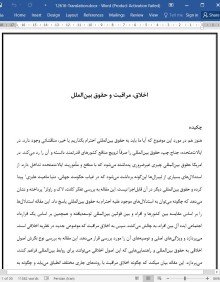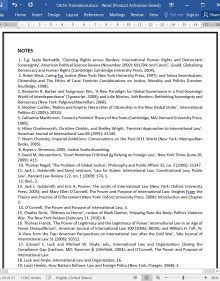
دانلود مقاله اخلاق، مراقبت و حقوق بین الملل
چکیده
هنوز هم در مورد این موضوع که آیا ما باید به حقوق بینالمللی احترام بگذاریم یا خیر، مناقشاتی وجود دارد. در ایالاتمتحده، جناح چپ، حقوق بینالمللی را صرفاً ترویج منافع کشورهای قدرتمند دانسته و آن را رد می کند. در امریکا حقوق بینالمللی چیزی غیر ضروری پنداشته می شود که با منافع و مأموریت ایالاتمتحده تداخل دارد. از استدلال های بسیاری از لیبرالها اینگونه برداشت می شود که در غیاب حکومت جهانی، دنیا ماهیت هابزی پیدا کرده و حقوق بینالمللی دیگر در آن قابل اجرا نیست. این مقاله به بررسی تفکر کانت، لاک و راولز پرداخته و نشان می دهد که چگونه می توان به استدلال های موجود علیه احترام به حقوق بین المللی پاسخ داد. این مقاله استدلال ها را بر اساس مقایسه بین کشورها و افراد و بین قوانین بینالمللی توسعه یافته و همچنین بر اساس یک قرارداد اجتماعی ایده آل بین افراد، به چالش می کشد. سپس به اخلاق مراقبت که موضوعی جدید در نظریه اخلاقی است، می پردازد و ویژگی های اصلی و توصیه های آن را مورد بررسی قرار می دهد. این مقاله به بررسی نوع نگرش اصول اخلاقی به حقوق بینالمللی و راهنمایی هایی که این اصول اخلاقی می توانند برای روابط بینالمللی فراهم کنند، می پردازد. این مقاله بیان میکند که چگونه اخلاق مراقبت با روندهای جاری مختلف انطباق می یابد و چگونه به تفکر جهانی سازی و وابستگی بینالمللی بیشتر، توجه بیشتری می شود. این مقاله استدلال می کند که اخلاق مراقبت بهوضوح از احترام به حقوق بینالمللی حمایت می کند اما این پشتیبانی آنچنان به مشکلات فعلی می پردازد که در دراز مدت موجب درخواست تجدیدنظر در قانون و اجرای آن می گردد که تا به حال کمتر چنین موردی پیش آمده است.
در حال حاضر، وضعیت و ارزش حقوق بینالملل یک موضوع مورد مناقشه است. حقوق بینالملل توسط بسیاری از محافظهکاران مورد حمله قرار گرفته است، توسط بسیاری از لیبرالها تضعیف شده و توسط بسیاری از اعضای جناح چپ رد شده است. تحولات جدید در رابطه با جهانی سازی و همبستگی جهانی، موضوع حقوق بینالملل را ضروری تر کرده است اما مهمترین دلیل پرداختن به حقوق بینالملل، تهدید وجود خشونت در مقیاس گسترده است.
دلایل خوبی وجود دارد که حقوق بینالملل را بهترین امیدواری برای ادامه و پیشروی اهداف مشترک و اجتناب از بدترین فجایع جنگ و خشونت در آینده ای نسبتاً نزدیک، بدانیم. بسیاری از مذاکرات و گفتگوها در مورد حکومت جهانی به این صورت پیش می روند که ما قبلاً چیزی مانند صلح جهانی داشته ایم و می توانیم خود را با عدالت توزیعی جهانی و دموکراسی و مسئولیت پذیری جهانی مشغول کنیم اما به نظر میرسد که هنوز زود است فرض کنیم موفق به غلبه بر خشونت گسترده شده ایم.
من در اینجا در مورد حقوق بینالملل صحبت خواهم کرد چراکه بیشتر بهعنوان یک ساختار ایده آل بسط و توسعه یافته است. و آن را بر اساس اصول جدید، مورد بحث قرار خواهم داد: بر اساس اصول اخلاقی فمینیستی مراقبت . بحث در مورد حقوق بینالملل در زمینه های اخلاقی چیز جدیدی نیست اما این زمینه ها معمولاً نسخهای از اصول اخلاقی کانت یا مکتب اصالت سودمندی و بهویژه نظریه قرارداد اجتماعی است. استدلال من متفاوت خواهد بود.
تعدادی از فیلسوفان فمینیست، جایگاه حقوق بینالملل را با توجه به حقوق بشر در نظر گرفته و از هنجارهای اخلاقی جهانی در این زمینه دفاع کرده اند.1 بهجای این کار من بهویژه بر هنجارهای بینالمللی مربوط به جلوگیری از درگیریهای خشونت آمیز تمرکز خواهم کرد. من درباره وضعیتی صحبت خواهم کرد باید از لحاظ اخلاقی با حقوق بینالملل مطابقت داشته باشد. پس از بررسی مختصر برخی از زمینه های سنتی که تصمیمات بر اساس آنها اتخاذ خواهند شد، استدلال ها را بر اساس اخلاق مراقبت بررسی خواهم کرد. من نشان خواهم داد که چرا این استدلال ها ممکن است بر سایر استدلال ها برتری داشته باشند و چگونه آنها از احترام به حقوق بینالملل حمایت می کنند. در استدلال این موضوع که اخلاق مراقبت از حقوق بینالملل حمایت می کند، من کاری را که بسیاری از نظریه پردازان برای قوانین داخلی انجام داده اند، برای حقوق بینالملل انجام نخواهم داد: نشان دادن اینکه چگونه قوانین باید در پرتو ارزشها و شیوههای مراقبت تغییر کنند.2 من به این پرسش پیشین- اما ضروری برای حقوق بینالملل- می پردازم که ما چگونه باید به طور کلی از حقوق بینالملل حمایت کنیم. حقوق بینالملل به اندازه ای مخاطره آمیز است که این سؤال باید بهشدت مورد توجه قرار بگیرد و به صورت رضایتبخشی به آن پاسخ داده شود چراکه مراقبت بهعنوان مبنایی برای بررسی روشهای دقیق، توصیه می کند که تغییراتی در حقوق بینالملل صورت بگیرد.
مراقبت و آینده
اگرچه اخلاق مراقبت احترام به حقوق بینالملل در آیندهای نزدیک و قابل پیشبینی را توصیه میکند، اگر دیدگاه بلندمدتتری نسبت به جهانی که باید مورد هدف قرار گیرد اتخاذ شود، این دیدگاه متفاوت خواهد بود. نظریهپردازان حقوقی بسیاری معتقدند که در اخلاق مراقبت، قانون به اندازه کافی پاسخگوی مشکلات و اختلافات جهان نیست. از منظر مراقبت، قانون یک رویکرد محدود برای یک دامنه محدود از فعالیت انسانی است. برای این حوزه، ممکن است بهترین امید در کوتاهمدت فرار از بدترین بلایای آتی از تصورات امپریالیستی، تعصب مذهبی و درگیری میان دولتها و گروهها باشد. با این حال، هنگامیکه چگونگی پیشرفت جهان به سمت چیزی بهتر از مجموعه ای از ایالتها و گروههایی که به دنبال منافع خود هستند و آماده استفاده از خشونت هستند را پیشبینی میکنیم، بهتر است درون محدودیتهای حقوق بینالملل اخلاق مراقبت به چیزی رضایتبخشتر و راههایی برای حرکت به سمت آن امیدوار باشید. چنین تفکری بسیار سازگار با وابستگی متقابل بین ایالتها و سایر گروههایی است که به طور فزایندهای توسط بسیاری از افراد که در مورد شرایط جهانی فکر میکنند، فهمیده میشود.
Abstract
Whether we should respect international law is in dispute. In the United States, international law is dismissed by the left as merely promoting the interests of powerful states. It is attacked by the right as irrelevant and an interference with the interests and mission of the United States. And it follows from the arguments of many liberals that in the absence of world government the world is in a Hobbesian state of nature and international law inapplicable. This article reviews the thinking of Kant, Locke, and Rawls, among others and shows how arguments against respect for international law can be answered. It questions arguments based on the analogy between states and individuals, and between international law as it has developed and law based on an ideal social contract between individuals. It then turns to the ethics of care, a recent addition to moral theory, and examines its major characteristics and recommendations. It considers how the ethics of care would view international law and the guidance this moral approach could provide for international relations. The article shows how the ethics of care is compatible with various current trends, and how thinking about globalization and greater international interdependence would benefit from greater attention to it. The article argues that the ethics of care would clearly support respect for international law as it has developed, but that it would even more strongly support addressing current problems in ways that would, in the longer term, make appeals to law and its enforcements ever less necessary.
The standing and value of international law are much in dispute at the present time. International law is attacked by many conservatives, undermined by many liberals, and dismissed by many on the left. New developments toward globalization and global interconnectedness make the case for international law more urgent, but the more vital reason to concern ourselves with international law is the threat of large-scale violence.
There are good reasons to consider international law the best, if limited, hope for the relatively near future to further our shared goals and avoid the worst horrors of violence and war. Many discussions of global governance proceed as if we already had something like global peace and could proceed to concern ourselves with global distributive justice and global democracy and accountability, but it seems premature to assume we have overcome large-scale violence. I will argue here for international law as it has developed rather than as an ideal construct. And I will argue for it on a novel basis: on the basis of a feminist ethics of care. It is not novel to argue for international law on moral grounds, but those grounds are usually some version of Kantian ethics, or utilitarianism, and/or, especially, social contract theory. My argument will be different.
A number of feminist philosophers have considered the status of international law with respect to human rights and have defended universal moral norms in this context.1 I will focus instead especially on international norms concerned with avoiding violent conflict. I will ask about the standing that we ought, morally, to accord to international law. After briefly considering some traditional grounds on which we ought to make this decision, I will examine arguments based on the ethics of care. I will show how they may be superior to other arguments and how they support respect for international law.
In arguing that the ethics of care would support international law as it has developed, I will not try to do for international law what various theorists have done for domestic law: showing how law should be changed in the light of the values and practices of care.2 I will be dealing with the prior*but essential for international law*question of whether and how we ought to support international law at all and in general. International law is sufficiently precarious that this question needs badly to be addressed and needs to be answered satisfactorily as a basis for examining the detailed ways care would recommend changes in international law.
CARE AND THE FUTURE
Although the ethics of care would recommend respect for international law in the near and foreseeable future, if one takes a longer term view of the world to be aimed at, the view would be rather different. To the ethics of care, law is not as much of an answer to the problems and conflicts of the world as many legal theorists suppose. From the perspective of care, law is a limited approach for a limited domain of human activity. For that domain, it may be the best hope in the short run for escaping the worst impending disasters of imperialist delusions, religious fanaticism, and conflicts between states and groups. As we look ahead, however, to how the world needs to progress toward something better than an aggregate of states and groups all pursuing their own interests and ready to use violence, at best within the restraints of international law the ethics of care offers hope of something more satisfactory and of ways to move toward it. Such thinking is highly compatible with the interdependence between states and other groups increasingly understood by many persons thinking in global terms.
چکیده
تردید هایی در رابطه با حقوق بینالملل
توجیه های سنتی و مشکلات آنها
اخلاق مراقبت
مراقبت و حقوق بینالملل
مراقبت و آینده
منابع
Abstract
DOUBTS ABOUT INTERNATIONAL LAW
TRADITIONAL JUSTIFICATIONS AND THEIR PROBLEMS
THE ETHICS OF CARE
CARE AND INTERNATIONAL LAW
CARE AND THE FUTURE
NOTES
- اصل مقاله انگلیسی با فرمت ورد (word) با قابلیت ویرایش
- ترجمه فارسی مقاله با فرمت ورد (word) با قابلیت ویرایش، بدون آرم سایت ای ترجمه
- ترجمه فارسی مقاله با فرمت pdf، بدون آرم سایت ای ترجمه


